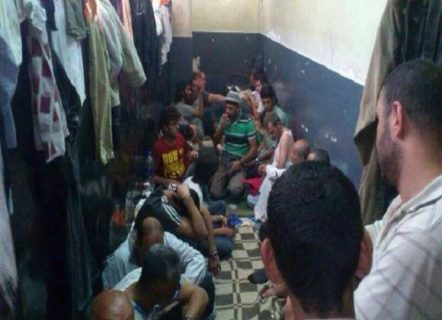Egyptian human rights organizations have documented the death of two political detainees during the past two days due to medical negligence and lack of health care, bringing the number of deaths inside the prisons of Abdel Fattah El-Sisi during 2022 to at least 48 deaths.
This comes at a time when the Egyptian government continues to promote its prisons as “5-star hotels” supported by medical services and equipment at the highest level, denying any deaths due to medical negligence, which contradicts the augmented reality with current and former prisoners’ accounts of the dire conditions of prisons, especially medical services in it.
The first victim is Jihad Abdul Ghani Salim (33 years old), who has been detained since 2015 and sentenced to 15 years in prison on the background of a political case. He breathed his last inside the medical centre in Badr Prison, after suffering for more than a year and a half from cancer of the mouth and throat, amid extreme intransigence from the Ministry of Interior in providing him with appropriate health care in the right place and at the right time, despite numerous appeals from his family and human rights organizations. Leaked messages from Jihad during his illness revealed that the prison administration deliberately tortured and killed him slowly by not allowing him to obtain medicine and appropriate treatment, which prompted the Egyptian Network for Human Rights, which documented the circumstances of his death, to hold the Egyptian authorities fully responsible for his death.
The second victim is detainee Ashraf Abdel Salam Mansour (46 years old), a teacher at the Ministry of Education in Sharkia Governorate, who died in his prison cell in Burj Al Arab prison in mysterious circumstances. Mansour, who was sentenced to 15 years in prison on the background of a political case, went on an open-ended hunger strike in November 2021 to protest against ill-treatment in Zagazig prison, so he was severely beaten and disciplined, then later deported to Burj Al-Arab prison, according to the “Their right” initiative, concerned with following up the conditions of detainees.
According to an inventory conducted by Egypt Watch, at least 48 prisoners have died in Egyptian prisons and places of detention since the beginning of 2022 until now. According to the” Their right/hachom” initiative, at least 1,145 detainees have died in prisons and official places of detention, not counting the unofficial sites. Egyptian prisons are an environment that encourages the proliferation of diseases, as the rates of overcrowding in them reach record levels. According to the government-affiliated Egyptian National Council for Human Rights, the percentage of prison overcrowding is about 150%, exceeding 300% in police stations. At the same time, independent organizations estimate the situation to be much worse. Egyptian prisons are famous for their filth and violation of hygiene and health rules, as there is no running water, no proper ventilation, and most of the time, sunlight does not enter them. In November 2019, two United Nations experts said abusive detention conditions in Egypt “may seriously endanger the health and lives of thousands of prisoners.”
On top of all this, there is an apparent failure in prisoners’ health care. According to former detainees, the prison authorities obstruct medical care procedures for nothing but to abuse them, as the necessary drugs are refused entry to patients, and prison administrations also refuse to leave patients for treatment in hospitals, even at their own expense. The Egyptian authorities are not afraid of the consequences of medical negligence in prisons. Even politically significant detainees, locally and internationally, were not spared, led by the late President Mohamed Morsi, who suffered greatly due to medical negligence and died during his trial. UN experts hinted that the conditions in Egyptian prisons directly led to Morsi’s death, as the former Egyptian president had diabetes and high blood pressure. Despite that, he was prevented from obtaining life-saving care, and as a result, he suffered from poor eyesight. Gradually he lost sight in his left eye and often fell into a diabetic coma and unconsciousness. In addition, he suffered from tooth decay and gum infections without medical attention. Conditions in the new prison complexes, which government media mouthpieces describe as “hotels”, are no better. The new Badr Prison witnessed three deaths due to medical negligence during the current and last month, and dozens of complaints were received of ill-treatment and violation of the rights of prisoners and their families.
Last November, six human rights organizations condemned the sexual harassment of prisoner Omar Muhammad Ali inside Badr Prison by police officers, as three of them forcibly removed his clothes while he was handcuffed and repeatedly harassed him in the presence of the prison investigation inspector. Last October, the family of Dr Abdel Moneim Aboul Fotouh (71 years), head of the Strong Egypt Party and former presidential candidate, said that their father was suffering greatly inside Badr Al Jadid Prison, where he was transferred without clothes, cover, or any personal belongings, and was imprisoned in a solitary cell. Surveilled by cameras 24 hours a day, lit 24 hours a day, and devoid of any equipment other than a mattress on the floor, Without a bed or chair.
Ahmed Aboul Fotouh quoted his father as saying that the situation in the new prison is “deadly,” describing whoever took and implemented the decision to transfer his father from Al-Mazraa prison to Badr prison as “below to every sense of humanity and must be tried for premeditated murder.” Ahmed confirmed that his father was imprisoned in his cell for eight consecutive days without any exercise, seeing a doctor, or receiving medical care due to his poor health conditions and exposure to more than one previous heart attack.





Recent Comments